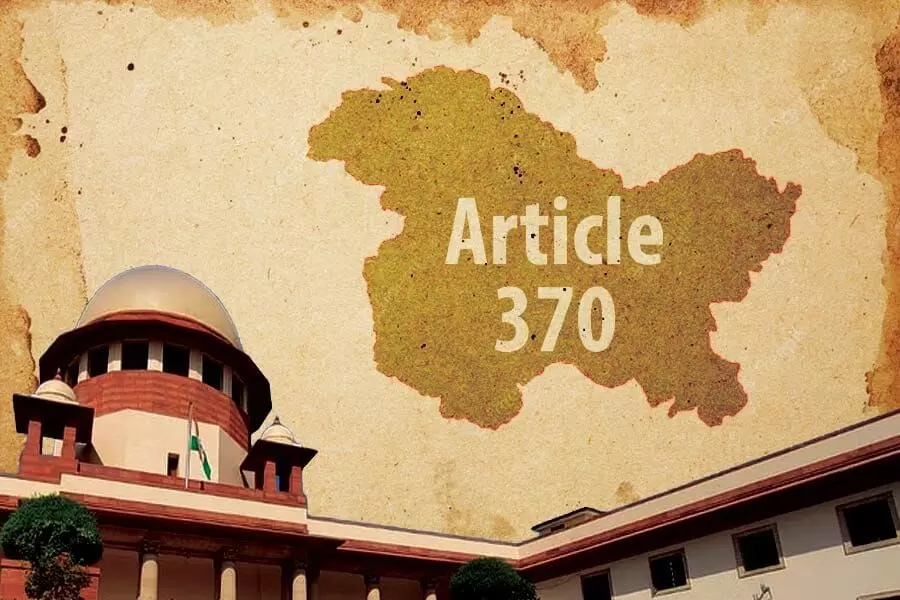SC upholds abrogation of Article 370, calls for polls by September next year
“The Constituent Assembly of J&K was never intended to be permanent body,” the CJI stated
By Newsmeter Network
Representational Image
New Delhi: The Supreme Court on Monday upheld the government's decision to abrogate Article 370, which bestowed special status on the erstwhile state of Jammu and Kashmir, and said steps should be taken to conduct elections in the assembly by September 30 next year.
Writing the judgement for himself and Justices Gavai and Surya Kant, Chief Justice of India D Y Chandrachud said Article 370 of the Constitution was a temporary provision and the president has the power to revoke it.
The apex court also upheld the validity of the decision to carve out the union territory of Ladakh from Jammu and Kashmir in August 2019.
The erstwhile state of Jammu and Kashmir does not have internal sovereignty different from other states of the country, he said.
"... all provisions of the Indian Constitution can be applied to J-K," the CJI said.
"We hold the exercise of presidential power to issue constitutional order abrogating Article 370 of Constitution as valid," the CJI said.
Jammu and Kashmir became an integral part of India and this is evident from Articles 1 and 370, he said while pronouncing the judgment.
“The Constituent Assembly of J&K was never intended to be permanent body,” the CJI stated.
Article 370, which was abrogated on August 5, 2019, was an interim arrangement due to war conditions in the erstwhile state, Justice Chandrachud said.
The princely state had become an integral part of India and this is evident from Articles 1 and 370, the CJI said.
The bench comprising CJI D Y Chandrachud and Justices Gavai, Surya Kant, Sanjay Kishan Kaul, Sanjiv Khanna, assembled at 10.56 am to pronounce the three separate and concurring judgements Justices Kaul and Khanna wrote their judgments separately.
The apex court reserved its verdict in the matter on September 5 after a 16-day hearing on a batch of petitions challenging the abrogation of the provisions of Article 370.
On Supreme Court constitutionally validating the removal of Article 370 in Jammu and Kashmir, senior Congress leader and Maharaja Hari Singh's son Karan Singh says, "A section of people in J&K who will not be happy with this judgment, my sincere advice is that they should accept the inevitable and they should accept the fact that now this has been done and the Supreme Court has upheld the action and therefore there's no point now unnecessarily hitting their head against the wall. Now my suggestion is that they should turn their energies towards fighting the next elections. That is where the people should now be motivated instead of developing any negativity"
The pronouncement of the verdict by the CJI is underway.
Advocate Nikhil Kamble of Supreme Court and High Court of Maharashtra says, " Irrespective of today’s judgement of Constitution bench of Supreme Court, “the rehabilitation of Hindus, the end of terrorism and protection of human rights of the people of J&K have not happened yet”
Pointers:
Supreme Court's Article370 judgment in nutshell :
President's order (CO 273) abrogating the special status of Jammu and Kashmir upheld.
Article 370 is a temporary provision.
J&K retained no sovereignty.
CO 272 (which changed the definition of 'J&K Constituent Assembly' as 'J&K Legislative Assembly') is invalid. But this is of no consequence since the Court held that the President can declare 370 inoperative even without any recommendation of JK Constituent Assembly.
Court did not decide whether the conversion of J&K as State was invalid since Union undertook to restore the statehood to JK as soon as possible. Court upholds the creation of Ladakh UT.
Court directs that elections to the JK Assembly be held by September 30, 2024.
Justice Kaul recommends that a Truth and Reconciliatory Commission be set up to investigate and report on the human rights violations by both State and non-State actors carried out in Kashmir valley since 1980s.